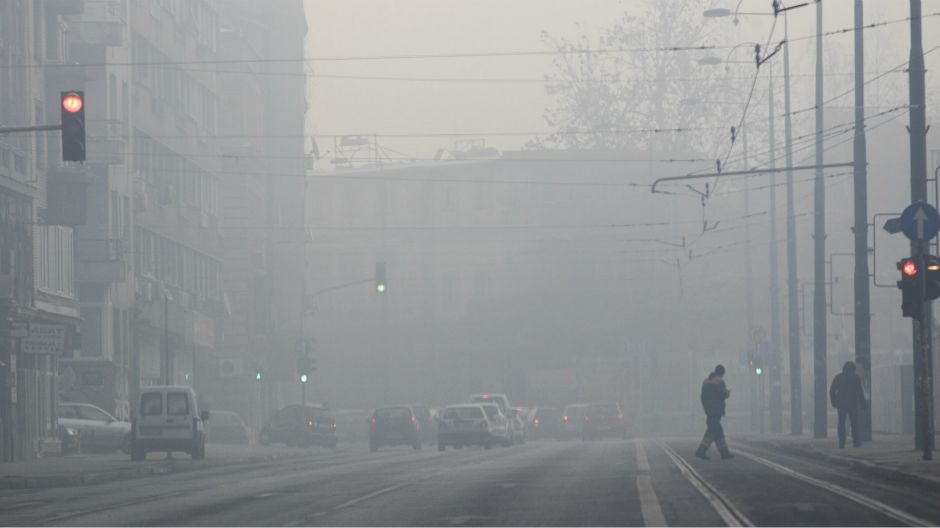In the previous days, there was a sudden deterioration of air quality in Sarajevo and other parts of Bosnia and Herzegovina due to worsening weather conditions and the formation of a strong temperature inversion.
The result of that deterioration led to a drastic jump in values at most stations in the Federation of BiH – Sarajevo, Zenica, Tuzla, Maglaj, Kakanj, Visoko, Travnik, Jajc, Bihac, Lukavac and Živinice. Satisfactory air quality was only in Mostar and Livno, according to the Federal Hydrometeorological Institute.
In addition to the exceedances of floating particles, sulfur dioxide exceedances were recorded in Zenica, Visoko and Kakanj.
“The values of sulfur dioxide exceeded the hourly alarm threshold values (500 micrograms per cubic meter). November was one of the cleanest months since measurements have been taken. The reason for this is unstable weather with a lot of precipitation and wind. In the coming period, we can expect frequent exceeding of limit values in all urban and industrial parts. None of this is unexpected nor is it something new that is happening in FBiH, this is a multi-decade problem and something that will happen in the future as well. A classic winter in Bosnia and Herzegovina,” he told Anadolu Agency Enis Krečinić, expert associate from the Environmental Sector of the Federal Hydrometeorological Institute of BiH.
– Gases more dangerous than dust –
Even this year, the authorities of Bosnia and Herzegovina have not tackled air pollution in the country, which prematurely claims lives and damages the health of thousands of people every year.
Fog, like the one in Sarajevo, which was present more than half a century ago, due to temperature inversions, due to poor ventilation, contributes to the retention of harmful particles, which makes the air in the city particularly polluted and poses a danger to its population.
Polluting particles have a harmful effect on the health of chronic patients, allergy sufferers, small children, but also the healthy population, emphasizes specialist pulmonologist and allergist Zehra Dizdarević, professor and former minister of health in Sarajevo Canton.
“During this period, there is a worsening of the underlying disease, such as obstructive lung disease, heart disease. An acute condition can also occur during this period, but also an exacerbation of a chronic disease. In Sarajevo, we record a high concentration of dust PM10 and PM2.5, but we have and other gases that are even more dangerous than dust and they enter the most distant airways,” Dizdarević told Anadolu.
She added that Bosnia and Herzegovina and Sarajevo lack a strategy and an action plan to deal with heavy pollution every year and to alert the population.
“Sarajevo is a valley, there are six mountains and a lot of tall buildings. There is no air flow. Even in the old records, it was determined which way the air flow should flow in Sarajevo. That it should go from Baščaršija towards Marindvor. However, we blocked it with buildings next to Miljacka and prevent any air flow. We only think of small particles, but worse are the gases that seep in and lead to chronic obstructive disease, patients have difficulty breathing and are dependent on oxygen. We cannot help the patient in this vicious cycle, it has to be continuous, that we know in advance when there will be pollution and that the population is alerted and does not go outside, and that they take care of everything that causes respiratory diseases,” said Dizdarević.
– Consequences of exposure to harmful substances –
In the long term, the Sarajevo professor warns, the consequences of exposure to harmful substances are much more serious, and every individual is at risk of developing one of the diseases.
“There are various elements in that dust that are carcinogenic, therefore, in addition to the diseases we mentioned, we also have the impact of pollution on lung cancer. We have various harmful substances that are carcinogenic,” said Dizdarević.
When it comes to preventive measures that can be taken to reduce the risk of getting sick, Dizdarević recommended that citizens do not leave their houses and apartments if they do not have to, and if it is absolutely necessary, then to keep outdoor movement as short as possible. She especially appealed to parents not to take their children outside if the air is unfavorable, so that they come into contact with particles as little as possible.
“Children’s lungs are developing. All these exposures cause different types of bronchitis and every other child has them. However, if he has an allergy, a cold, there is even more damage,” said Dizdarević, stating that the responsibility for prevention lies with the authorities, as well as on individuals.
– BiH has the fifth highest death rate from air pollution in the world –
Because the country relies on coal and wood for heating and coal for electricity generation, Human Rights Watch published a report last year stating that Bosnia and Herzegovina’s cities are among the most polluted in the world during the winter months and that the country has the fifth highest death rate from air pollution in the world.
According to World Bank estimates, every year 3,300 people in the country die prematurely from air pollution, which is nine percent with of deaths.
The reason for this is the fact that the country relies on coal and wood for heating, and coal for electricity generation.
“The complex system of government in the country also presents difficulties in the fight against air pollution. There is no national body for environmental protection, and there are many standards and regulations that are poorly coordinated between different levels of government. Both entities that make up the federal government have their own legal frameworks, organizational structures and air quality networks, making it difficult to coordinate approaches to air quality management,” Human Rights Watch said.

















